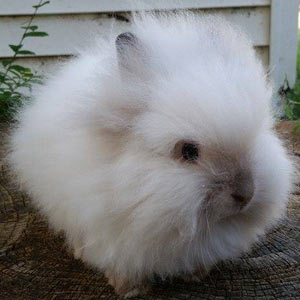Everything You Need To Know About Lionhead Rabbit
Lionhead Rabbits are popular little pets due to their unusual woolly mane, charming looks, and compact size.
Although they may be sociable and lively when handled properly, acquiring a Lionhead is not a decision that should be made hastily. They can be shy and require well-balanced food as well as much room and entertainment.
Are Lionhead rabbits good pets?
 Although Lionhead Rabbits can make good pets, they may not be the greatest choice for first-time pet owners with kids.
Although Lionhead Rabbits can make good pets, they may not be the greatest choice for first-time pet owners with kids.
They’re intelligent, friendly, and lively in general, but they’re also one of the most cautious domestic rabbit breeds. They can quickly feel terrified, which can lead to violent behavior. They require a calm, stress-free environment and must be treated with caution. Gradually increase your touch with your Lionhead. Allow them to approach you on their own terms, and make sure you have a nice treat on hand so they begin to identify you with positive experiences. Don’t pick them up too quickly, and if you do, don’t suffocate them with no means to get out.
Lionhead Rabbits are incredibly smart creatures. To avoid boredom, they require a lot of enrichment and stimulus. They require places to do their normal digging and gnawing. This is not only beneficial for your rabbit’s overall health, but it also prevents them from picking up other, less fitting items around your house or garden.
Make sure their hutch and run are stocked with a variety of rabbit-safe toys and chew things. If they’re a house rabbits, you’ll need to divert them to appropriate items and make sure the areas they have access to are rabbit-proofed.
Do Lionhead rabbits like to cuddle?
 The majority of rabbits enjoy being cuddled. You’ll have to do it in the “proper” manner, but they adore being picked up, petted, and hugged. Bear in mind, however, that rabbits are unique individuals. The vast majority of rabbits who appreciate being cuddled have been adopted from a young age by their owners. You may discover that an older rabbit is fearful and that you are unable to properly hold them.
The majority of rabbits enjoy being cuddled. You’ll have to do it in the “proper” manner, but they adore being picked up, petted, and hugged. Bear in mind, however, that rabbits are unique individuals. The vast majority of rabbits who appreciate being cuddled have been adopted from a young age by their owners. You may discover that an older rabbit is fearful and that you are unable to properly hold them.
It’s also possible that some rabbits dislike being carried by strangers. This is due to the fact that rabbits are a prey species. However, as previously said, whether or not your rabbit enjoys cuddling is a matter of personal preference. This is a skill that you’ll have to learn.
It’s also a good idea to avoid cuddling a bunny too firmly, which is something that children often do. It is critical that you do not squeeze the bunny when holding it. This will terrify them. They will be less inclined to want to be held as a result.
Do Lionhead rabbits bite?

Typically, nipping or biting is a behavior used by rabbits to attract attention. If your bunny does this, the remedy is to squeal loudly each time he does it. This informs the bunny that his nipping is injurious to you. You’ll notice that he’ll nip softer in the future, or that he’ll quit altogether.
Rabbits, in addition to nipping for attention, may bite in a more dangerous fashion. Rabbits can be aggressive and territorial at times. Rabbits that have been spayed or neutered can help to alleviate these behaviors. Developing a trusting bond with your rabbit might also be beneficial. (For more information on how to develop a relationship with your rabbit, see this article.)
Rabbits are a prey species and they can feel susceptible or exposed to danger easily, perceiving anything that we might assume as normal, like danger. Actions such as holding it in a way that limits a movement for example, can make them feel threatened and they will bite you if they choose so as a defense mechanism.
Can Lionhead rabbits live alone?
No, keeping a single rabbit as a pet would be cruel because rabbits are social animals. Imagine if you are confined to a room alone for a long period of time with no one to talk to or be social with. They may get stressed and anxious if they are forced to live alone. Because lionheads are easily frightened, they will benefit from having a partner.
Isolation can be deadly for social animals, that especially live in groups or even communities of themselves. Being social and having others nearby provides a sense of security and certainty rather than being alone, which imposes danger to the natural instinct of an animal.
It’s fine to match two different rabbit breeds as long as their sizes aren’t excessively different. A Netherland Dwarf, Himalayan, or Mini Lop would be an excellent match for a Lionhead.
Do Lionhead rabbits need haircuts?
Anyone thinking about getting a Lionhead rabbit should be aware of the amount of grooming necessary. Brushing your rabbit’s mane at least once every two days is required. You’ll probably need to brush your rabbit every day if you have a double-maned rabbit. The mane around the head, as well as any additional fur around the hindquarters, should be your main focus.
If your Lionhead rabbit’s rear end has lengthy fur, it might need to be clipped. If the hair becomes soiled with rabbit excrement or pee, it needs to be trimmed.
Grooming is required for a variety of reasons. Your rabbit’s mane will grow matted and knotted if you don’t take care of it. Tangles can be extremely uncomfortable and must be taken out. In addition, if your rabbit accumulates too much fur, he or she will be obliged to eliminate it, which may result in hairballs. Hairballs are linked to gastrointestinal stasis, a dangerous digestive disorder. Take the time to groom your rabbit at least once every two days to avoid disease and discomfort.
What do lionhead rabbits eat?
 The food requirements of lionhead rabbits are the same as those of other tiny rabbits. In practice, this means providing them with limitless grass hay, and water, a reasonable amount of green vegetables, and a modest amount of high-fiber pellets.
The food requirements of lionhead rabbits are the same as those of other tiny rabbits. In practice, this means providing them with limitless grass hay, and water, a reasonable amount of green vegetables, and a modest amount of high-fiber pellets.
Lionhead rabbits are particularly prone to oral disorders. As a result, it’s advised not to feed this rabbit any sweet meals (including fruit). You can ‘treat’ your rabbit with different foods like Brussel sprouts and herbs to be on the safe side.
Can Lionhead rabbits eat carrots?
 If we’ve learned anything from movies and cartoons, it’s that bunnies adore carrots. While this is true, their diet does not rely primarily on carrot consumption.
If we’ve learned anything from movies and cartoons, it’s that bunnies adore carrots. While this is true, their diet does not rely primarily on carrot consumption.
Rabbits, contrary to popular opinion, should not eat carrots on a daily basis. In fact, your rabbit should only be consuming the tops and greens of carrots. It can cause a variety of health problems in your pet rabbit, some of which might result in early death or excruciating agony.
Because carrots have abnormally high sugar content. According to research conducted by the RSPCA in the United Kingdom, 11% of all rabbits examined had teeth disease as a result of being overfed with carrots and other fruits and vegetables.
While your rabbit may not display signs of pain as a result of their tooth rot, you should be aware that it is giving them a great deal of discomfort. Furthermore, if the tooth decay worsens, it could lead to your rabbit’s death.
Even if we ignore the dental rotting issues, you need to consider the stomach problems that consuming carrots may give your rabbit. Your rabbit will be unable to adequately digest the meal, resulting in illness.
Sugar will have the same effect on a pet rabbit as it does on you and me. This entails hyperactivity as well as a slew of diseases we don’t desire. It can, in essence, cause your animal’s death prematurely.
To conclude, the lionhead rabbit is an amazing pet to have, with its unique ‘mane’ and majestic fur which is an attractive trait. However, like any pet, any carelessness or neglect of a pet can lead to dire consequences that nobody would like to go through. With great care and the right knowledge, your rabbit will be able to live a happy and healthy life.
https://www.rabbitproducersassociation.com/everything-you-need-to-know-about-lionhead-rabbit/https://www.rabbitproducersassociation.com/wp-content/uploads/2021/06/Lionhead-Rabbit-1.jpghttps://www.rabbitproducersassociation.com/wp-content/uploads/2021/06/Lionhead-Rabbit-1-150x150.jpgUncategorizedLionhead Rabbits are popular little pets due to their unusual woolly mane, charming looks, and compact size. Although they may be sociable and lively when handled properly, acquiring a Lionhead is not a decision that should be made hastily. They can be shy and require well-balanced food as well as...Netherland Dwarf Rabbit domains@dmhubtraining.comAdministratorNetherland Dwarf Rabbit


Leave a Reply